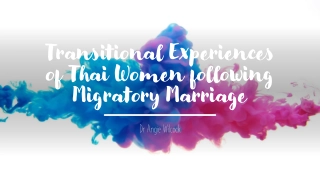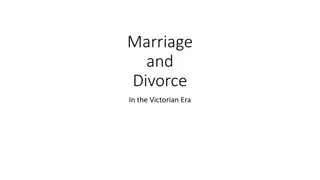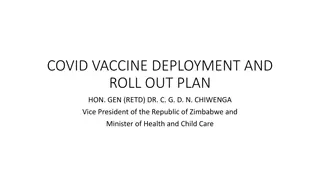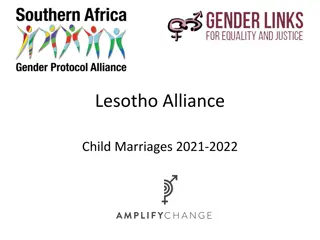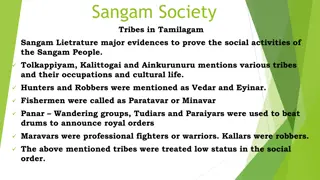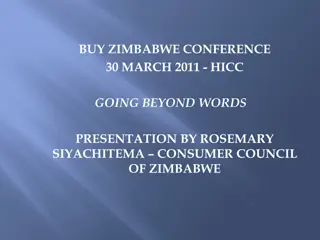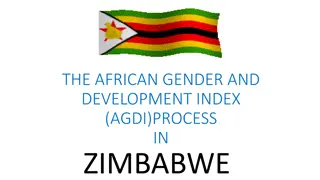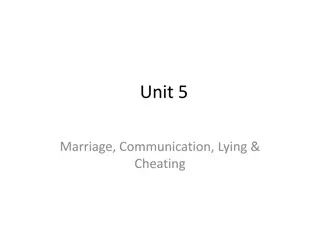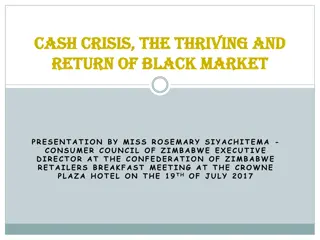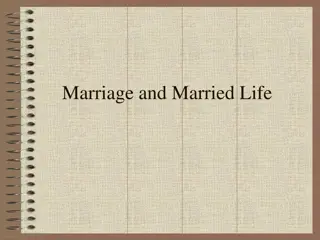Marriages Laws in Zimbabwe: A Historical Overview
Marriages in Zimbabwe are governed by various Acts such as the Married Person's Property Act and the Marriage Act, each specifying different rules regarding community of property and contract requirements. Since 1929, marriages are considered out of community of property by default, but parties can choose to opt out through an ante/pre-nuptial agreement. Types of marriages include civil marriages under the Marriage Act and potentially polygamous customary marriages under the Customary Marriages Act.
Download Presentation

Please find below an Image/Link to download the presentation.
The content on the website is provided AS IS for your information and personal use only. It may not be sold, licensed, or shared on other websites without obtaining consent from the author. Download presentation by click this link. If you encounter any issues during the download, it is possible that the publisher has removed the file from their server.
E N D
Presentation Transcript
MARRIAGES ACT CHAPTER MARRIAGES ACT CHAPTER 5.17 5.17 Prisca Dube Zimbabwe Lawyers for Human Rights
HISTORICAL BACKGROUND FOR MARRIAGES HISTORICAL BACKGROUND FOR MARRIAGES By virtue of the Married Person s Property Act [Chapter 5.12] as of 1 January 1929 all marriages in Zimbabwe became out of community of property, Section 2(1): Community of property and of profit and loss and the marital power or any liabilities or privileges resulting therefrom shall not attach to any marriage solemnized between spouses whose matrimonial domicile is in Zimbabwe entered into after the 1st January, 1929, unless such spouses shall, by an instrument in writing , signed by each of them prior to the solemnization of and in the presence of two persons, one of whom shall be a magistrate, who shall subscribe thereto as witnesses, have expressed their wish to be exempted from this Act . their marriage
This means that any and all types of marriages contracted after 1 January 1929, became out of community of property which means individuals acquire profit/loss, property and other assets as individuals within the marriage. If parties want to contract differently, the Married Person s Property Act states that they must do a ante/pre-nuptial agreement before a lawyer who is a notary public, one of the witnesses should be a magistrate, the document shall be published in the Gazette and upon proof of such publication be registered with the Registrar of Deeds within 28 days after its execution.
This ante/pre-nuptial agreement shall not be valid unless so registered. This is because by their very nature marriages are public contracts between two consenting adults. Public in that there is: - Announcement of banns for three consecutive weeks in church, - Notice and advertising in the public notice board at the courts, or, - Involvement of families and a go-between in customary marriages Thus, those wanting their marriage to fall outside the default setting for all marriages in Zimbabwe must follow the prescribed manner.
TYPES OF MARRIAGES IN ZIMBABWE The Marriage Act [Chapter 5.11] former Chapter 37 is a civil marriage under general law and provides for a monogamous contract between a male of +18 years and a female of +16 years. Marriage officers are church pastors and magistrates. The Customary Marriages Act [Chapter 5.07] former Chapter 238 is a potentially polygamous marriage as per custom which ordinarily allow a man to marry more than one wife. Zimbabwe has never had polyandry. This marriage can only be contracted before magistrates and ages of parties are not spelt out under the Act. Unregistered Customary Law Union [UCLU] where customary rites of marriage have been followed but parties have no marriage certificate. Potentially polygamous and ages of parties not prescribed at law.
MARRIAGE ACT 5.17 MARRIAGE ACT 5.17 The Marriages Act [Chapter 5.15] was gazetted on 27 May 2022. But Statutory Instrument 141 of 22 in Section 3 corrected by stating: The Marriages Act [Chapter 5.15] shall be read and construed as if amended in Section 1 by the deletion of {Chapter 5.15} and the substitution of [Chapter 5.17] . REASON: Act had erroneously been assigned Chapter Number that was already assigned to another Act. The main purpose of the new Marriages Act is to consolidate the law relating to marriages. The new law shall come into operation on a date to be fixed by the President by notice in the Government Gazette.
It must be highlighted that the age-old distinction between a 5.11 marriage (former Chapter 37) and a 5.07 marriage (former registered customary marriage Chapter 238) will no longer exists. All marriages will be deemed to be equal though parties will still be able to upgrade from customary marriage to a civil marriage if the man is not married to other women. Section 41 of the Marriages Act [Chapter 5.17] introduces partnership which is not a marriage per se but is a relationship that gives rise to several consequences in respect of property distribution should it be dissolved. civil
HAS DEFAULT SETTING CHANGED? NO. The default setting remains as has been since 1 January 1929. Marriages in Zimbabwe remain out of community of property unless parties have an ante/pre-nuptial agreement. But, be it civil marriage, customary marriage or the new civil partnership set up, the notion of separation of estate of the parties is and will continue to be blurred upon dissolution owing to the courts approach of pooling the assets of the parties to ensure a just and equitable distribution of property as provided by the Matrimonial Causes Act [Chapter 5.13] which will be applicable across board.
SO, WHAT HAS CHANGED OR IS NEW? Minimum age of marriage and automatic criminalisation of child marriages. Consent to marriage. Recognised marriage regimes. Equal rights and obligations during marriage. Prohibition of incestuous marriages. Extension of who are or can be marriage officers. Formal introduction of civil partnerships. Repealing of, for example, wilful transmission of HIV as stand alone offence
MINIMUM AGE OF MARRIAGE The minimum age of marriage is eighteen years. Section 3 of the Marriages Act prohibits any person under the age of eighteen years from entering into a marriage, unregistered customary law union or a civil partnership. It is now a criminal offence for any person (other than the child concerned) to permit, allow, coerce, aid or solemnize the marriage of a child. This new section is in line with section 78(1) of the Constitution which provides that every person who has attained the age of eighteen years has the right to found a family. This section is in conformity with 2016 Constitutional judgment.
CONSENT TO MARRIAGE Each party to a marriage must give his/her free and full consent to a marriage before it can be solemnized or registered. Section 4 of the Marriages Act provides that no marriage can be solemnized or entered into unless such consent is given. Marriage officers will therefore have a duty to ask, ascertain and be sure that indeed both parties to a marriage are fully and freely consenting to being married to each other. This will ensure that no one is manipulated into a marriage that they do not want, for example, by being forced to marry someone in order to secure inheritance of your children where husband has died.
RECOGNISED MARITAL REGIMES Section 5 of the Marriages Act sets out the marital regimes recognized under our law, and these are namely, a civil marriage and a customary law marriage. A civil marriage is monogamous meaning that it is the lawful union of two persons to the exclusion of all others and no person may contract any other marriage during the subsistence of a civil marriage. A customary marriage, on the other hand, may be polygamous or potentially polygamous depending on the customary law of the people concerned. Additionally, a customary marriage may be converted into a civil marriage if the husband has no other existing spouse in polygamy.
Continuation Section 44 of the Marriages Act provides for the Application of Act to certain marriages other than civil or customary marriages. In other terms, the Act recognizes a further species of marriage, namely a qualified civil marriage which is a union between a man and a woman contracted under Islamic rites which can be registered subject to compliance with the provisions of the Act. And of note the issues of how the marriage was solemnized and the degree of relationship of the parties in the marriage as well as the consent of the parties are factors to be considered.
EQUALITY OF MARRIAGES Section 5(5) describes all marriages in terms of the Act as being equal. However, the law does not explain how the marriages are considered equal when civil marriage demands exclusivity and the other(s) do not. The different proprietary consequences that flow from monogamous and polygamous set ups impact on the said equality of marriages from onset. And because lobola ceremony on its own is not recognized by the Marriages Act as a valid marriage, section 17 therefore requires unregistered customary law unions to be registered within three months of the union with the Registrar of Marriages which would render them potentially polygamous customary marriages upon registration. The issue of equality of marriages seems pedantic and unrealistic if we consider the following on UCLU:
It should be understood that there is no sanction for failing to register an UCLU within the prescribed 90days/ 3months, but, making UCLU less equal. Upon termination of the union, there is nothing that prevents the union from being treated as a civil partnership [we hope the courts will indeed be very robust in their approach on UCLUs] with the same principles being applied to the division of the assets of the parties seeing that as the law stand these UCLU are excluded from the application of Matrimonial Causes Act upon their dissolution. Possibly the lawmaker intended this to encourage those in UCLU to either formalize under civil marriage and or the customary marriage as prescribed. It should also be pointed out that the failure to register a customary law union does not affect matters relating to the status, guardianship, custody and rights of succession of the children of such marriage. But, women s property rights under UCLU are not as fully protected and thus a possibly rethinking here is called for.
EQUAL RIGHTS & OBLIGATIONS DURING MARRIAGE In terms of section 6 of the Marriages Act, parties to any marriage [civil, customary or partnership] have equal rights and obligations during the subsistence of the marriage and when the marriage is terminated. The question that arises from this provision is whether or not women in polygamous marriages will indeed have such equal rights and obligations, which would be an innovative and much awaited step forward in our law. But, as it stands from a straight reading, this is not so for women in UCLU already as the Matrimonial Causes Act somehow is not to apply to them. We wait for the courts to give guidance once this Act has an operationalization date.
PROHIBITION OF INCESTOUS MARRIAGES As has always been the case under section 75 of the Criminal Code, incestuous marriages are generally not permitted. Section 7 of the Marriages Act provides that any marriage between relatives within the prescribed degrees of relationship set out in the Criminal Code including parent and child, step-parent and step-child, brother and sister, uncle and niece, aunt and nephew, grand-uncle and grand-niece, grand-aunt and grand-nephew, grand-parent and grand-child and first or second cousins is forbidden (unless the parties concerned did not know that they were related to each other as first or second cousins or they belong to a community governed by customs that do not prohibit marriage between first and second cousins).
MARRIAGE OFFICERS UNDER THE ACT Under the Marriages Act, only a marriage officer may solemnize a marriage. The following officials or persons will act as marriage officers for the purposes of formalizing a marriage under the Marriages Act: - Magistrates, - Chiefs, - Heads of embassies and - Authorized ministers of religion [these will include ministers of religion for the newer churches who previously had a hard time becoming marriage officers able to officiate for their congregants.
INTRODUCTION OF CIVIL PARTNERSHIPS A civil partnership is a relationship between a man and a woman who are both above the age of 18 years and have lived together without being legally married. Civil partners must have a relationship as a couple living together on a genuine domestic basis. A civil partnership is not a marriage. However, in the event that the civil partnership is terminated, the Matrimonial Causes Act shall apply with the necessary changes. In terms of section 41(2) of the Marriages Act, the circumstances that are considered to decide whether a civil partnership exists include the duration of the relationship, the nature and extent of their common residence, whether a sexual relationship exists, the degree of financial dependence or interdependence and any arrangements for financial support between them, the ownership, use and acquisition of their property, the degree of mutual commitment to a shared life, the care and support of children and the reputation and public aspects of their relationship.
However, the exact nature of such a relationship is undefined by the Act as none of these factors is conclusive or a necessary pre-condition for a civil partnership. Thus, the precise nature of such a relationship remains open to interpretation by the courts and until such guidance is given ukutshaya amapoto remains blurry as to what now is and its parameters under the new law. Confusing matters and causing much panic among the public is the fact that section 41(5) of the Act appears to recognize that a civil partnership may exist when a person is legally married to someone else including a monogamous civil marriage. However, a court must not interfere with the rights of a spouse when dividing the assets of civil partners when such a partnership dissolves. This is easier said than done, particularly where the assets of spouses are jointly held.
Section 41(6) of the Marriages Act goes on to provide that the dissolution of a civil partnership cannot give rise to a charge of bigamy under the Code. The intention of the legislature here appears to have been that bigamy cannot arise because a civil partnership is not a marriage. We appear to be in new stormy and unchartered waters where it will be best for all body to introspect and make informed decisions on the marriage regime that one should contract under. There is need to be rational, realistic and really informed to appreciate why there has been the formally introduction of civil partnerships which are not new, but, the protection of and by the law at their dissolution for largely the benefit of women is very new and could be a game changer!
REPEALING SECTION 79 OF THE CODE Zimbabwe is working hard on ending HIV/AIDS by 2030. The country is in 2022 under the World Health Organisation validation process of ending mother-to-child-transmission of HIV and Syphilis, and intends to score the gold standard in this regard. The Marriages Act repeals the Section 79 of the Criminal Code and leaves Section 78 which deals with wilful transmission of sexual transmitted diseases. Section 78 suffices to cover HIV and thus having Section 79 was not only an over kill but exacerbated the stigma and discrimination on persons living with HIV.
CONCLUSION The Act will go a long way to protect women-PLHIV who ordinarily discover earlier than their male counterparts their HIV status and have been the majority arrested for wilful transmission of HIV. The Act criminalises child marriages and in having the necessary legal framework the country can indeed end this cancer that was affecting children who are predominately from poor backgrounds thus cycle of poverty was unending. Marriage law is now found in one place and issues of consent to marriage, expansion of who are marriage officers and the application of Matrimonial Causes Act at dissolution of marriages is most welcomed towards having fair and equitable distribution of property.
LET US TALK AND REASON TOGETHER QUESTIONS?


